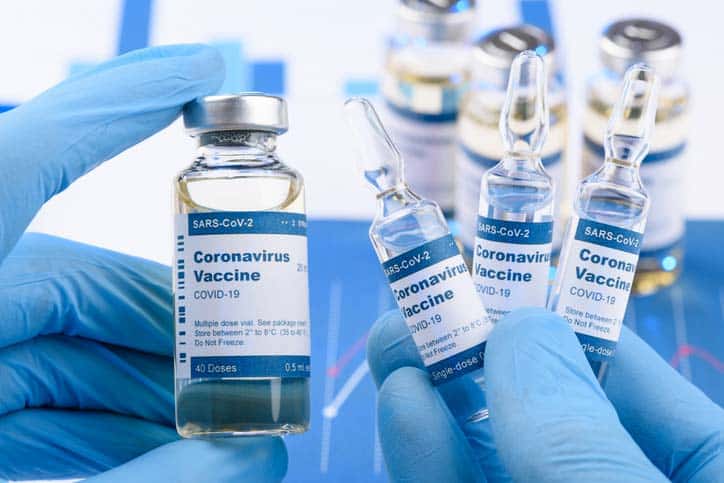By Lily Nhan, Esq.
On March 4, 2020, the City of Los Angeles declared a local emergency and put all of its residents into lockdown in an effort to reduce the spread of the Severe Acute Respiratory Syndrome Coronavirus 2 (SARS-CoV-2), also known as COVID-19. It seems like light years ago since the beginning of this pandemic when many of us put our lives on hold. Coupled with Governor Newsom’s on-going emergency orders for the State of California, many people are anxiously waiting for a “cure” to COVID-19, so that they can resume their “normal” way of life before it becomes just a faint memory.
Several pharmaceutical companies are soon debuting their promising COVID-19 vaccines. Yet, not everyone is jumping out of their seats for their chance to get inoculated. Now that the wish for a COVID-19 panacea is soon to come into fruition, there are concerns about the long term effects of the vaccine, its possible side effects, and the legal repercussions surrounding administering the vaccine. After all, the old saying “be careful what you wish for, lest it come true” is famous for a reason!
Pharmaceutical Testing in the United States
To fully evaluate the potential risks of receiving the soon-to-be available COVID-19 vaccines, it helps to understand how drugs and vaccines are normally approved in the United States. The U.S. Food and Drug Administration (FDA’s) Center for Biologics and Evaluation is responsible for regulating vaccines in the United States. A prospective vaccine’s development and approval often takes ten to fifteen (10-15) years of rigorous testing, reviews, and trials, involving several phases, in order to be approved by the FDA and CDC:
The Exploratory Stage: Typically, this is the first few 2-4 years during which academic and governmental scientists identify antigens that may fight or treat a disease.
The Pre-Clinical Stage: During the next 2-4 years, tissue-cultures, cell-cultures and a series of animal testing take place to assess the safety of a candidate vaccine.
The Vaccine Trials: By this point, five to six years have passed since the candidate drug was first introduced to the FDA. Within this phase, there are three sub-phases of clinical trials:
1. The testing of the candidate vaccine on a small group of adults, often comprised of 20-80 individuals, to assess the safety of the vaccine and to determine if it provokes a suitable immune response;
2. This phase tests a larger group of several hundred individuals with characteristics with whom the vaccine is intended (like age and health). These trials are randomized and controlled, and include a placebo group. The goal is to study the vaccine’s safety, immunogenicity, proposed doses, schedule of immunizations, and method of delivery;
3. This stage involves a larger trial, including thousands to tens of thousands of people to assess vaccine safety and to determine if there are rare side effects that develop which may not have surfaced in the prior, smaller group testing.
These three sub-phases can take up to ten (10) years to complete.
After the Vaccine Trials, the FDA continues to monitor the production of the vaccine, tests for potency, safety and purity, and may even conduct further testing to ensure the vaccine is still safe. Most vaccines enter an optional Phase 4 – where formal, on-going studies continue for years after the vaccine is approved and licensed.
The Race for the COVID-19 Vaccine
COVID-19 vaccines, on the other hand, have shortened the timeline from 10-15 years to a mere nine (9) months. The United States Congress passed Operation Warp Speed on March 27, 2020, allowing funding for faster vaccine development in an effort to find a “cure.” Several participating companies, including Pfizer, Moderna and AstraZeneca, are all in sub-phase 3 of their clinical trials and report very favorable results. They are making headlines for making their vaccines available for mass distribution before the end of 2020. For example, Moderna reports a 95% effective rate in preventing COVID-19 infection. A detailed explanation of the four different types of available vaccines can be found here: https://www.gavi.org/vaccineswork/there-are-four-types-covid-19-vaccines-heres-how-they-work.
But are they safe?
Critics of the upcoming vaccines fear that the vaccines have been haphazardly tested. They believe lengthy clinical trials are necessary to study the long term effects of the proposed vaccine on the person, the severity of the side effects on different groups of people, and the long term effective rates of the vaccine.
Even more concerning is that many of these pharmaceutical companies will require a “Vaccine Liability Waiver” which releases the pharmaceutical company for any injuries the vaccine may cause. In fact, in 2005, the United States implemented a law called the 2005 Public Readiness and Emergency Preparedness (PREP) Act to exclude tort claims from products that help control a public-health crises. The PREP Act was updated in April 2020, and now provides that companies “cannot be sued for money damages in court” for injuries caused by medical countermeasures for COVID-19, including vaccines. The only exception is willful misconduct of the pharmaceutical company. Furthermore, the PREP Act now bars COVID-19 injury claims from using the National Vaccine Injury Compensation Program, which was established in 1986, for people harmed by vaccines for other diseases. However, the Countermeasures Injury Compensation Program (CICP) will provide benefits for any COVID-19 side effects.
On the other hand, proponents of the COVID-19 vaccines argue that the small risk of an adverse reaction is worth any immunity to the virus in order to stop its spread. The benefits of the vaccine –even with the expedited testing and approval — can support the emergency responders and those in the medical field who are constantly exposed to COVID-19 positive patients. For some, there is no alternative, and they believe the COVID-19 vaccination will be an essential tool to help stop (or at least slow down) the pandemic.
Legal Implications of the Vaccine and the Workplace
Depending on your work industry, you might not have a choice to avoid a vaccine if your employer requires mandatory vaccination.
The Equal Employment Opportunity Commission (EEOC), the CDC and public health authorities currently consider COVID-19 as a direct threat of “a significant risk of substantial harm.” As such, a significant risk of substantial harm would be posed by having someone with COVID-19, or symptoms of it, present in the workplace during the COVID-19 pandemic. However, this may change, as the CDC and public health authorities are continuously assessing whether a direct threat still exists. Section 5(a)(1) of the Occupational Safety and Health Act (OSHA) imposes a duty on employers to provide a safe and healthy environment to protect employees in a workplace. COVID-19 would constitute a workplace hazard that can cause an accident or illness resulting in death or serious physical harm. A mandatory vaccination would make sense to protect employees from potential exposure.
Under the Americans with Disabilities Act (“ADA”), vaccinations and health screenings are “medical examinations” and therefore, the vaccination must be job-related, necessary to the business, or justified by a direct threat, and not more intrusive than necessary for the vaccination to comply with the ADA. As such, health care providers, schools, nursing homes, and other employers that work with high risk populations customarily can require mandatory vaccinations, while other employers (like law firms) may not.
If a business that does not have a medical necessity for the vaccination seeks to implement a mandatory vaccine policy, it may face some enforcement hurdles. Specifically, laws protecting employee rights give employees the right to reject a mandated vaccination to COVID-19. An employee may be exempted from a mandatory vaccine if the employee has a disability covered by the Americans with Disabilities Act (ADA) that prevents him from being vaccinated. An exemption to the vaccine would be considered a reasonable accommodation under the ADA.
Additionally, Title VII of the Civil Rights Act of 1964 may protect an employee’s right to decline a vaccine if receiving the vaccine violates the employee’s sincerely held religious beliefs, practices, or observances.
Finally, an employer must exercise due care before taking adverse employment action against employees who are in a union or union-related group who oppose a mandatory workplace vaccination. The result could be an unfair labor claim against the employer.
As such, the EEOC recommends private employers consider encouraging employees to be vaccinated rather than requiring employees to be vaccinated, depending on what industry the business is in. Mandating – or not mandating – vaccinations can result in worker’s compensation claims and negligence lawsuits. For example, if an employer requires vaccinations of its employees, and an employee suffers an adverse reaction, the employee may have a worker’s compensation claim against the employer. On the other hand, if an employee gets infected with COVID-19 at a business that does not institute a vaccination program, the employee may have the same claims against her employer for exposing her to a dangerous condition and suffering bodily harm.
Conclusion
As the COVID-19 vaccines are discussed, debated, and eventually distributed, it is important to remember that it will be difficult to return to our “normal” way of living. In the upcoming months, we recommend evaluating and tailoring your employment handbook to navigate the future that the COVID-19 vaccine brings. Please contact our employment law attorneys at Bradley, Gmelich & Wellerstein LLP to assist you with your COVID-19 vaccination policies once the vaccine becomes available to the general public.

Ms. Nhan earned her Bachelor’s Degree from the University of California, Los Angeles, with honors. She obtained her Juris Doctor from Villanova University School of Law, Philadelphia. Ms. Nhan was recognized by Pasadena Magazine’s “Top Attorneys” issue as one of the Top Attorneys in personal injury practice in 2013-2014 and 2017-2018.
Ms. Nhan is licensed to practice in all California state courts and the United States District Court for the Eastern District of California. She is a member of the Association of Southern California Defense Counsel, the Glendale Bar Association, and the Asian Pacific American Bar Association of Los Angeles. Ms. Nhan is fluent in Mandarin Chinese.

